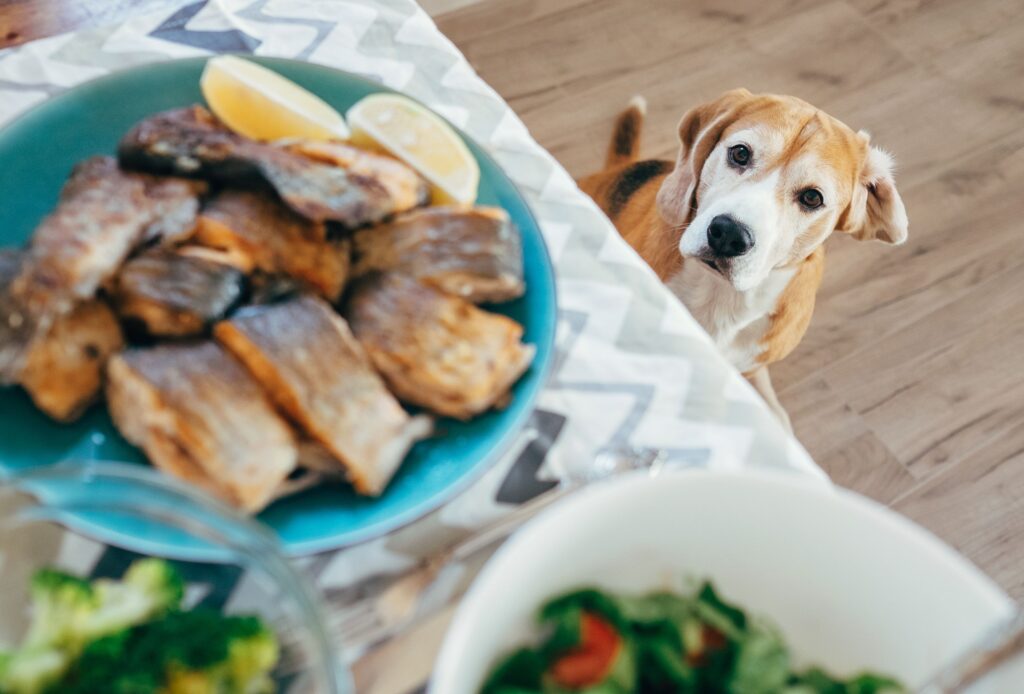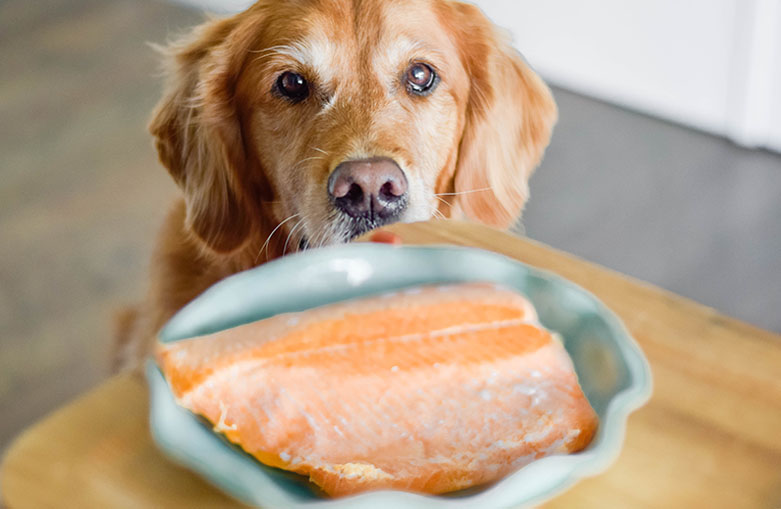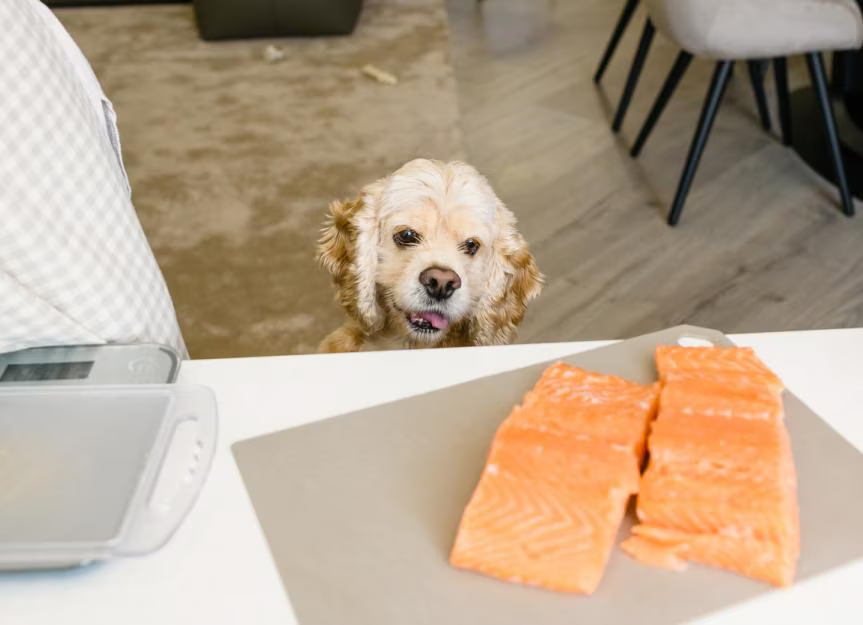Salmon is often considered one of the healthiest fish for humans, but what about dogs? Many pet owners wonder if dogs can eat salmon safely and what the potential benefits or risks might be. Let’s explore the topic in detail, from health benefits to safe preparation, while also considering potential risks and allergies for dogs. This guide will answer the question, “Can dogs eat salmon?” and help you understand how to introduce this nutritious fish into your dog’s diet.
Nutritional Benefits of Salmon for Dogs
Can Dogs Eat Salmon, salmon is packed with high-quality proteins and essential fatty acids like omega-3, which are incredibly beneficial for dogs. These nutrients support a dog’s coat, skin health, and immune system, making salmon a great dietary addition. Feeding your dog salmon can improve their fur texture and help reduce inflammation caused by conditions like arthritis or allergies.
Omega-3s also benefit brain development in puppies and help older dogs stay mentally sharp. Additionally, salmon is rich in vitamins B12, D, and selenium, which promote overall well-being. So, if you’re asking, “Can dogs eat salmon?” the answer is yes, as long as it’s prepared correctly.

Is Raw Salmon Safe for Dogs?
While salmon offers many health benefits, feeding raw salmon to dogs is a bad idea. Raw fish can contain harmful bacteria, such as salmonella and listeria, which can make your dog seriously ill. More concerning is the risk of a parasite known as Neorickettsia helminthoeca, which can cause salmon poisoning disease in dogs.
Salmon poisoning is rare but potentially fatal if not treated promptly. Symptoms include vomiting, diarrhea, fever, and lethargy. Therefore, if you’re wondering, “Can dogs eat raw salmon?” it’s safer to avoid it altogether.
Cooked Salmon: A Safer Option
Can Dogs Eat Salmon, the best way to serve salmon to your dog is by cooking it thoroughly. Baking or grilling salmon without any added salt, seasoning, or oils is the safest way to introduce it into your dog’s diet. Cooking eliminates harmful bacteria and parasites that may be present in raw fish.
When preparing salmon, make sure to remove any bones. Salmon bones can easily become a choking hazard or cause internal injuries. As long as you cook it properly and debone it, salmon is a safe and healthy choice for your dog.
Salmon in Dog Food: What You Need to Know
Can Dogs Eat Salmon, many commercial dog foods include salmon as a primary ingredient due to its nutritional value. Some high-quality dog foods even market salmon-based formulas specifically for dogs with sensitive skin or food allergies. These foods often contain salmon oil as a supplement, providing a rich source of omega-3 fatty acids.
If you’re not keen on preparing salmon yourself, purchasing dog food that contains salmon can be an excellent way to offer your dog these health benefits without the hassle.
Can Dogs Eat Canned Salmon?
Canned salmon is another convenient way to introduce fish into your dog’s diet, but there are some caveats. Look for canned salmon packed in water rather than oil and make sure there’s no added salt or seasoning. The same rule applies to bones in canned salmon: remove any large or sharp bones to prevent choking hazards.
Always read the label carefully to ensure you’re not feeding your dog any unnecessary preservatives or additives. Used in moderation, canned salmon can be a quick and easy treat for dogs.
Salmon Oil: A Supplement for Dogs
If you don’t want to feed your dog whole salmon, consider giving them salmon oil as a dietary supplement. Salmon oil is high in omega-3 fatty acids and offers the same skin and coat benefits as feeding whole salmon. You can add it to your dog’s regular kibble or food.
Salmon oil supplements are widely available in pet stores and are often recommended by veterinarians to improve skin conditions or boost a dog’s overall health.
Allergies and Risks of Feeding Salmon to Dogs
Can Dogs Eat Salmon, while salmon is generally safe and beneficial, some dogs might be allergic to fish. If you’re introducing salmon to your dog for the first time, start with a small amount and monitor their reactions closely. Symptoms of a food allergy can include itching, swelling, gastrointestinal issues, or hives.
Another risk associated with salmon is mercury poisoning. Though salmon is considered low in mercury compared to other fish like tuna, long-term consumption could pose risks, especially if you’re feeding large quantities regularly. Stick to feeding salmon in moderation, and consult your vet if you’re concerned.

Safe Salmon Recipes for Dogs
Can Dogs Eat Salmon, If you’re looking to treat your dog to some homemade salmon meals, here are a few simple recipes:
Baked Salmon and Veggie Dog Food
- Bake a skinless, boneless salmon filet at 350°F for 20-25 minutes.
- Steam carrots, peas, and sweet potatoes.
- Mix the baked salmon with the veggies.
- Let the mixture cool and serve as a meal or a treat.
Salmon and Rice Dog Dinner
- Cook a skinless, boneless salmon filet thoroughly.
- Boil brown rice according to the package instructions.
- Combine the cooked salmon and rice.
- Add a small amount of salmon oil for extra omega-3s.
These simple, nutritious recipes ensure that your dog enjoys the benefits of salmon without the risks associated with raw or improperly prepared fish.
Can Dogs Eat Salmon Skin?
Can Dogs Eat Salmon, many pet owners might wonder if dogs can also enjoy salmon skin, which is often rich in healthy fats. The answer is yes, dogs can eat salmon skin as long as it’s cooked and served in moderation. Salmon skin contains high amounts of omega-3 fatty acids that can further enhance a dog’s coat, skin, and overall health. However, it’s important to remember that salmon skin is fatty, and too much can lead to obesity or gastrointestinal issues. Always serve it in small amounts and ensure it’s free of seasoning, salt, or harmful additives.
Final Verdict: Can Dogs Eat Salmon?
To conclude, dogs can safely eat salmon, provided it’s cooked and served in moderation. The nutritional benefits of salmon are numerous, ranging from improved skin and coat health to a boost in brain development. However, raw salmon is a big no due to the risk of parasites and bacterial infections.
Can Dogs Eat Salmon, by feeding your dog properly prepared salmon, you can introduce a high-quality protein source rich in essential nutrients. As always, consult your veterinarian before making any significant changes to your dog’s diet.
Also read: Can Dogs Eat Eggshells?





